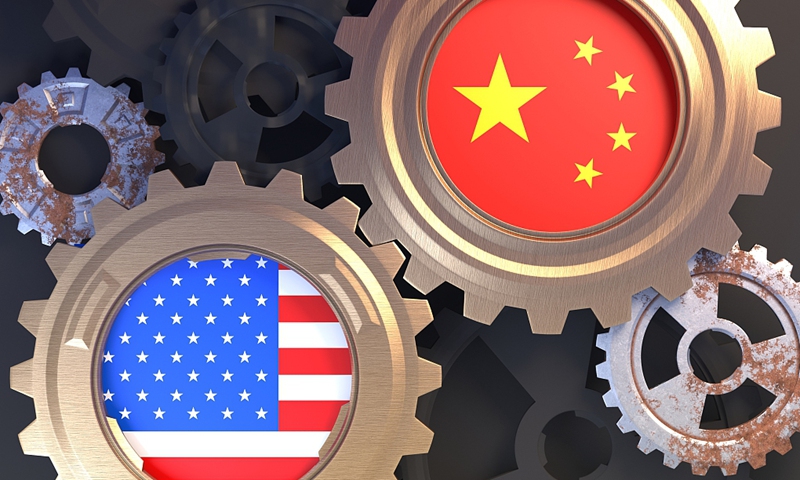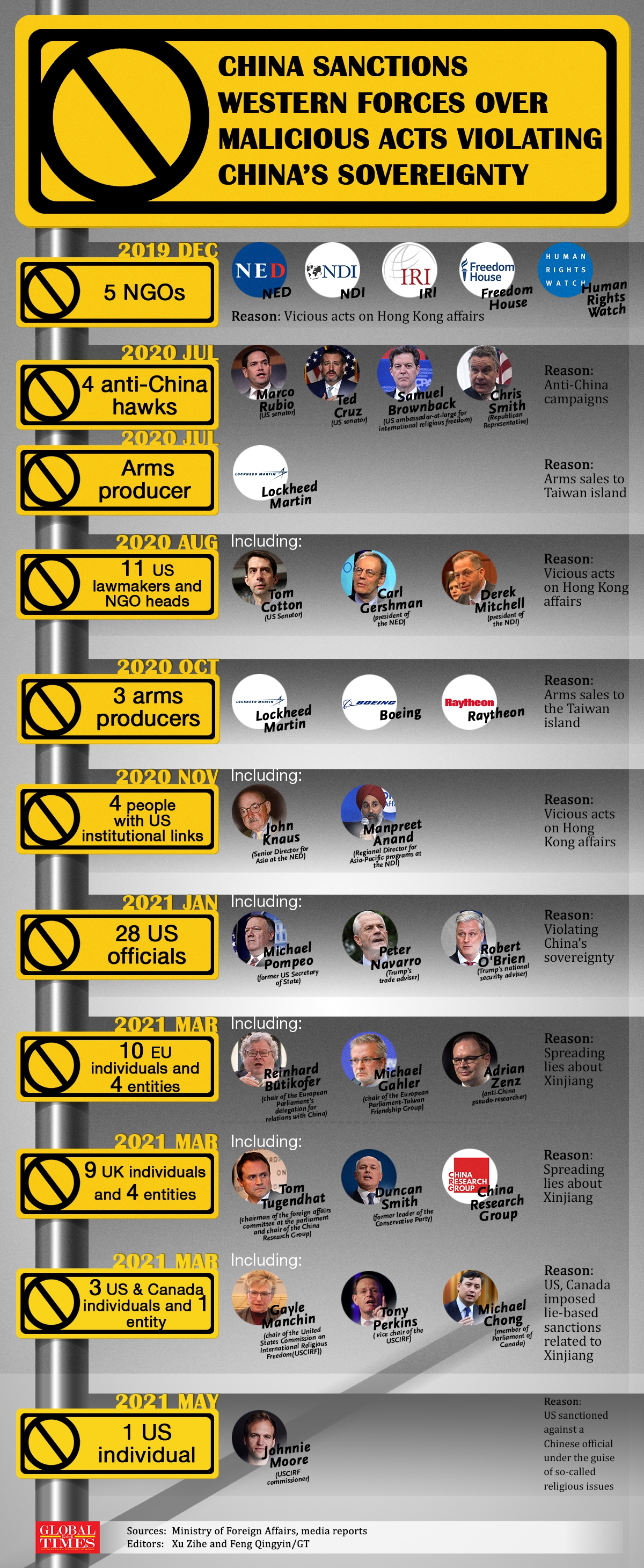
china-us
China's anti-foreign sanctions draft law - the first of its kind - was proposed to the ongoing session of the Standing Committee of the 13th National People's Congress (NPC) on Monday. The law is expected to provide strong legal support and guarantee for the country against the unilateral and discriminatory measures imposed by foreign countries.
It was also widely hailed by Chinese legal experts as a necessary move to strengthen the country's legal toolkit in the face of more blatant interference and crackdowns of the US-led West against Chinese entities and individuals.
The 13th NPC Standing Committee convened its 29th session on Monday in Beijing, which is scheduled to conclude on June 10, with a proposed agenda to review a number of draft laws and deliberate draft revisions. The announcement of the anti-foreign sanctions law was also in line with the top legislature's annual work schedule, unveiled in March, which indicated that China will enhance legislation in foreign-related fields by focusing on moves against sanctions and interference, and countering long-arm jurisdiction.
Some Western governments, out of political need and ideological prejudice, have been using Xinjiang-related topics and other excuses to spread rumors and suppress China, which particularly violates international laws and basic norms of the international relationship. They imposed so-called sanctions citing their laws on Chinese officials, and blatantly interfered in China's internal affairs, the spokesperson of the Legislative Affairs Commission of the NPC Standing Committee was quoted as saying in a report by the Xinhua News Agency.
Some NPC deputies and Chinese People's Political Consultative Conference members, along with representatives from various sectors of society, came up with suggestions about a specific law to counter foreign sanctions, which has also become a major task this year, the spokesperson said.
A draft law in the agenda of the Standing Committee meeting should be generally reviewed three times before being put to a vote. However, if there's a consensus on all aspects of the draft law, it can be reviewed twice, according to the rules and procedures of the legislative body.
The anti-foreign sanctions draft law has been now put into review for the second time, which is expected to be voted by the top lawmakers soon.
Legal experts said that speeding up legislation in foreign-related fields is necessary as it's important to use legal measures to safeguard the legitimate rights of Chinese institutions, enterprises and citizens. Especially in recent years, the US government has been imposing sanctions on some Chinese entities such as high-tech firms Huawei and ZTE for so-called national security risks, and sanctioned a number of senior Chinese officials under the US' so-called Xinjiang and Hong Kong bills last year.
While the EU has a regulation to protect against the effects of the extraterritorial application of legislation adopted by a third country and the US owns a large number of "legal ammunition" in terms of long-arm jurisdiction, China lacks relevant laws in response to the external legal weapons, Qi Kai, an associate professor of the Institute of Globalization and Global Issues at China University of Political Science and Law, told the Global Times on Monday.
"We should learn from them in enhancing our legal tools. Whether to use those tools or not remains unknown, but they have the deterrent effect," Qi said, noting that a certain country abusing the power of long-arm jurisdiction will do harm to the world, and formulating such a law also sends a clear warning to the US on this matter.
Besides the EU, Russia also passed a law to counter the unfriendly behavior of the US and other countries in June 2018 to protect the interests, security, sovereignty and territorial integrity, as well as the rights of its citizens immune to the unfriendly behavior of the US. The countermeasures include an end or halt to cooperation with unfriendly countries or institutions, a ban or restrictions on trade of relevant products and raw materials with those countries.
Speeding up legal protections In response to the increased unilateral moves of the US government, Chinese authorities have also taken corresponding countermeasures since last September. On September 19 last year, the Ministry of Commerce (MOFCOM) unveiled the provisions of China's unreliable entity list, which has been viewed by some as a measure by Beijing to counter US crackdown on Chinese companies. The list details the rules that could lead to severe penalties against foreign entities and individuals who undermine China's national interests and Chinese companies' legitimate rights.
MOFCOM also issued a new order on January 9 adopting necessary countermeasures against the unjustified extraterritorial application of foreign legislation.
As MOFCOM came up with general administrative rules as legal defense against the US bullying of China, China also responded to Washington's blatant interference in China's internal affairs with a series of countermeasures announced by the Ministry of Foreign Affairs over the past year - for example, by sanctioning former US Secretary of State Mike Pompeo and other US individuals in January and hitting back at 10 EU lawmakers and individuals, as well as four entities in March in response to EU's moves against Chinese officials over the Xinjiang issue.

China's list of sanctions against Western forces over their meddling in China's domestic affairs related to HK, Taiwan and Xinjiang. Graphic: Xu Zihe and Feng Qingyin/GT
When it comes to responding to foreign sanctions, our current legal tools are far from sufficient, Yang Yonghong, a law professor at Southwest University of Political Science and Law, told the Global Times on Monday. "No matter the adoption of necessary countermeasures against unjustified extraterritorial applications of foreign legislation or the unreliable entity list, they belong to administrative regulations, and the foreign ministry issued countermeasures targeting special personnel, which also came out from the administrative department," she said.
The US Congress, however, approved the sanctions bills against foreign individuals and entities, empowering different departments such as the Department of the Treasury and Department of Commerce to impose detailed measures, which are much more precisely designed and well established, Yang said, noting that US Congress also explicitly authorized the executive bodies with administrative powers.
By taking the example of the US, "we should formulate relevant laws as soon as possible," she added.
The anti-foreign sanctions legislation marks an unprecedented move to put in place a wide-reaching yet sophisticated legal firewall to protect Chinese businesses and citizens, economists said.
The draft law being deliberated, when enforced, would deter foreign governments, notably the US and the EU, from resorting to long-arm jurisdiction to unruly crack down on Chinese entities, as the proposed law epitomizes the national will to strengthen its legal weapon against foreign infringement of the rights and interests of the Chinese government and businesses, Sun Fei, economist and director of the International Economic Research Center of Jiujiang University, told the Global Times on Monday.
Foreign governments would weigh the trade-offs of defying the law before deciding on any anti-China moves, according to Sun, former director of the Chinese Enterprises Overseas Development Center.
Even if Chinese entities are hit with unjustified sanctions, the proposed law is supposed to crystallize actionable countermeasures against the foreign governments and institutions that target Chinese businesses or individuals, the economist added, expecting the legal effort to make up for losses that Chinese entities would suffer in case of foreign sanctions.
Moreover, as Sun suggested, more targeted legislative moves should be in the pipeline to get the country prepared for unexpected disputes and tensions, and render itself a true defender of multilateralism and globalization.
He cited the Australian federal government's decision to tear up Victoria's Belt and Road agreements with China as a wake-up call for China to broaden extraterritorial reach of its own legislation.
Such treachery would have been costly for Canberra if China's anti-foreign sanctions legislation had come into effect, observers said.





